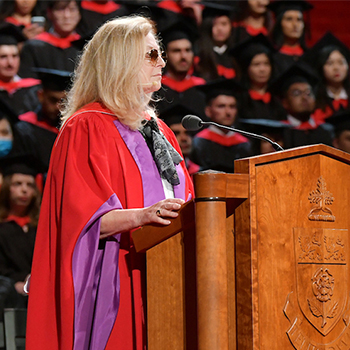Pandemic lockdowns and restrictions, Zoom lectures, protests, occupations and the war in the Ukraine all served as a backdrop for the convocation address delivered by publishing legend Anna Porter to graduands of the Faculty of Liberal Arts & Professional Studies during York University’s Convocation ceremony on June 15. Porter, who was on the York University convocation stage to receive an honorary degree, spoke on the theme of freedom. “I thought I would talk today about freedom. The freedom to write what you wish to write, to speak, to disagree, to take chances, to read what you wish to read, to be who you want to be,” said Porter.
A Canadian publisher, novelist and the founder of Key Porter Books, Porter is an officer of the Order of Canada and is the recipient of the Order of Ontario. She began her convocation address by recounting details of her own childhood beginning with her birth in Budapest, Hungary. “I was born in a dictatorship – a place where freedom did not exist, where you could not criticize the government, where writers were considered dangerous. They were silenced, imprisoned, sometimes killed for failing to support the government-approved narrative,” she said, noting that her grandfather, who was a publisher, was stripped of his company and put in prison for the simple act of speaking his mind. He was sentenced to 18 months of hard labour.
Furthermore, she said that her family along with other citizens were not permitted to travel outside of their country. She recounted how her mother was twice imprisoned for trying to cross the border into Austria. “I was only five years old and quite enjoyed my couple of weeks in prison, but my mother had a very difficult time,” said Porter. “She lost much of her hair and her hands became arthritic from working with feathers and wool for stuffing. The second time, we spent only overnight in a jail guarded by Russians at the border.”
In Canada, Porter said that people take freedom for granted. “It is difficult to be enthusiastic about it because it’s the water we swim in every day,” she said.

Her history and important role as a publisher and writer has kept freedom at the front of her mind, more so now with the return by Russa to its autocratic roots and its invasion of Ukraine. “Sadly, Russia under President [Vladimir] Putin’s autocracy, has returned to the repressions of the Soviet era,” she said. “Since 1990, the number of murdered Russian writers has grown alarmingly, but not surprisingly. A regime that does not allow free speech, or a free press, will silence independent voices. The majority of Ukraine’s writers were ‘disappeared’ when Ukraine was part of the Soviet Union.”
So, it is no wonder, she said, that citizens of Ukraine are fighting back against Putin’s opinion that the dissolution of the Soviet Union was the world’s greatest geopolitical loss.
Quoting Canadian author Margaret Atwood, who noted that tyrannical governments silence writers because they represent the voice of individuals, Porter laid out in detail the persecution of writers in numerous countries, some of which included Ethiopia, Turkey, Saudi Arabia and Azerbaijan.
She highlighted that Canada and the United States are also on a dangerous and slippery slope into similar restrictions, saying that while “we do not imprison our writers, we are on a slippery slope when we ban their books.” She noted that some U.S. states have banned 2SLGBTQIA+ books and important Black and BIPOC authors in school libraries, while several school libraries in Canada have pulled classics such as Philip Pullman’s His Dark Materials, Alice Munro’s novel Lives of Girls and Women and Margaret Laurence’s The Diviners, which is a Canadian classic, from shelves.
Porter closed her master class with a congratulations to graduands and a cautionary plea to remember the fragility of freedom and not to take it for granted.
As a final closing salvo to those who would consider a blinkered restriction of freedom, Porter observed, “this year, the Durham school board wanted to pull all copies of The Great Bear from school libraries because it might be offensive to Indigenous Peoples. The author, David Robertson is Cree.”
Originally published in YFile.
